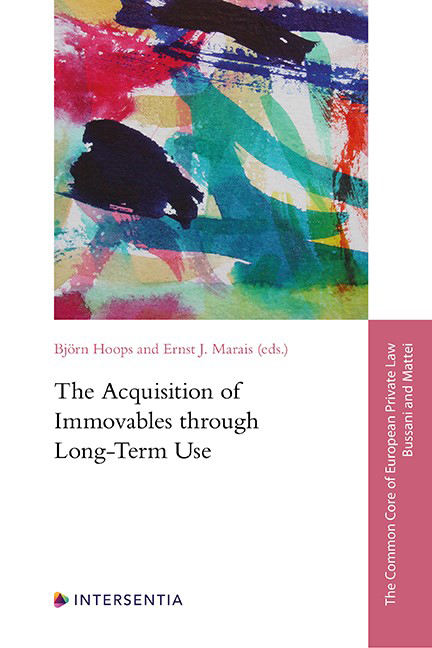Book contents
- Frontmatter
- General Editors’ Preface
- Preface
- Contents
- List of Cases
- Table of Legislation
- List of Abbreviations
- List of Contributors
- Case PART I INTRODUCTORY MATTERS
- PART II CASE STUDIES
- PART III GENERAL CONCLUSIONS
- Appendix I Instructions for the Project on the Acquisition of Immovables through Long-Term Use
- Index
Case 1 - Living on Another’s Land without Permission
Published online by Cambridge University Press: 26 May 2022
- Frontmatter
- General Editors’ Preface
- Preface
- Contents
- List of Cases
- Table of Legislation
- List of Abbreviations
- List of Contributors
- Case PART I INTRODUCTORY MATTERS
- PART II CASE STUDIES
- PART III GENERAL CONCLUSIONS
- Appendix I Instructions for the Project on the Acquisition of Immovables through Long-Term Use
- Index
Summary
Variation 1.1. Living on another’s land without permission
Nelson is the registered owner of a parcel of land at the outskirts of Joanna Town. He has built a house on the land and laid out a garden. While on vacation, Nelson meets the love of his life. To live together with his partner, he decides to leave Joanna Town. However, he would like to keep the parcel of land for his adult children and does not sell or transfer it to anyone. A few weeks later, Jacob and Mpumi, who have been living on the streets for a couple of months, notice that the house on Nelson’s parcel is uninhabited. Jacob and Mpumi move into the house with all their belongings. After a year, their lives have normalised. They work, maintain the house, take care of the garden, and put up a fence around the house and the garden. Twenty-one years later and after a traumatising divorce, Nelson, who has been paying the rates and taxes pertaining to the land, comes back to Joanna Town and discovers Jacob, Mpumi, and their family living in the house. Nelson approaches a court to obtain an order to evict them and, subsidiary to that, sues them and the state for compensation. Jacob and Mpumi are now wondering what formalities to observe in order for their presence not to be challenged and to be recognised by others.
Variation 1.2. Living on another’s land without permission and a transfer to a third party by the original owner
See Variation 1.1. Jacob and Mpumi have been living in Nelson’s house for 31 years. Instead of getting divorced and returning to Joanna Town, Nelson decides to sell his house. Natalia buys the house. Natalia and Nelson observe all formalities for the transfer of the land. Natalia approaches a court to obtain an order to evict Jacob, Mpumi, and their family.
Variation 1.3. Living on another’s land without permission and the fate of security rights in land
See Variation 1.1. The National Bank has held a security right in Nelson’s land for 25 years. Jacob and Mpumi have been living in Nelson’s house for 22 years. As Nelson defaults on the secured loan he has from the National Bank, the Bank wishes to exercise its security right.
- Type
- Chapter
- Information
- The Acquisition of Immovables through Long-Term Use , pp. 93 - 206Publisher: IntersentiaPrint publication year: 2022



